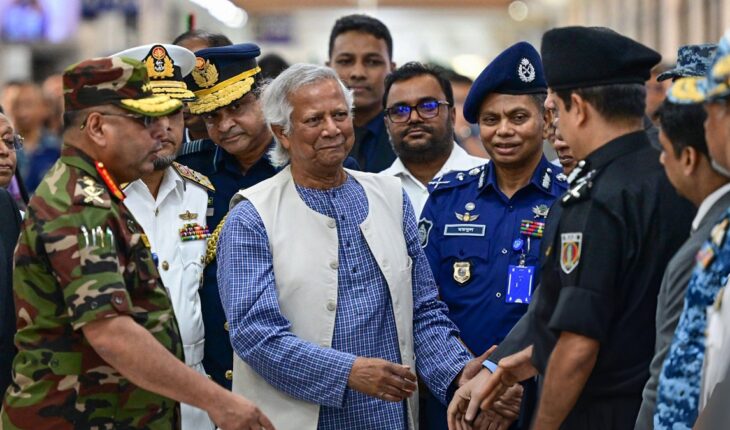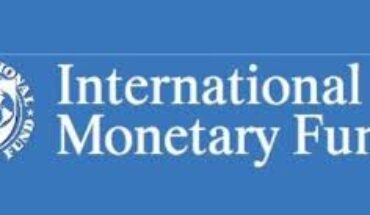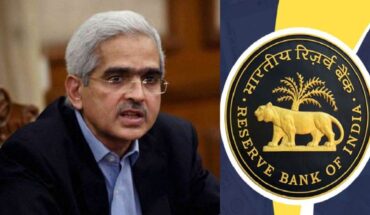With the swearing-in of Muhammad Yunus, a noted economist and Nobel laureate, as the Chief Adviser, the decks have been cleared for a non-political consensus government in Bangladesh. The nomenclature of the chief advisor instead of appointing Yunus as the prime minister has been used to avoid political controversy regarding the veteran economist.
It is not known when the fresh polls in the country will take place, but the interim government having the blessings of the army chief General Waker-uz-Zaman, might continue till the supporters of the erstwhile government were finally subdued.
The army has adopted the strategies being adopted in Pakistan, where the elections took place only after destroying Imran Khan’s Pakistan Tehreek-i-Insaf (PTI). His supporters have also been deprived of the PTI’s symbol to contest elections. It means, the agenda of the new regime in Dacca would be crushing all political opinions having secular or progressive agenda.
The final takeover of the Islamists under the Army’s patronage has not taken place suddenly. Earlier, the deposed Prime Minister, Sheikh Hasina, was cautioned regarding the political ambitions of Zaman, but she ignored the advice. She elevated him,her close relative, on June 23 this year, who within 40 days of his elevation physically chased out his mentor using disparate political elements, including Jihadists and students. In the presence of the air force and navy chiefs, he ensured her farewell from the coveted office.
Zaman and his colleagues had scripted a foolproof strategy for the unceremoniously removal of an elected prime minister without firing a single bullet. It is also quite intriguing how the issue of the reservation quota in jobs, which was already resolved by the Hasina Government, could cause massive countrywide protests among students. The issue became alive recently, when the beneficiaries of the reservation moved the Supreme Court. The apex court, however, allowed only a six percent quota for the weaker sections and the descendants of the Mukti Bahini, the irregulars who had finally ousted the Pakistani army from the then East Pakistan.
There is hardly any criticism of the end of democracy in the West. Instead, Hasina’s removal is being described as the end of a dictator. Zaman is also being praised for ensuring Hasina’s escape to India in a helicopter without any physical harm.
It is stated that before forcing Hasina to resign, Zaman had held the meeting of the army commanders on August three. He told them that Hasina’s removal was necessary to prevent further chaos in the country. He, however,cunningly camouflaged his role in preventing the civil police in diffusing the situation based on a false narrative and propaganda, and got Yunus agreeing to become the face of the military sponsored regime.
The Resignation : Zaman was exposed when he announced the resignation of Hasina instead of the president of Bangladesh, Mohammad Shahbuddin. He, however,
announced the dissolution of Parliament by conceding the demand of the agitating students.
Zaman-led the security establishment supported by Islamists have also been maligning Hasina by making selective leaks. Thus, before being finally evicted from the coveted office, she was maligned as a leader crushing her opponents as well as the agitating students opposed to the job reservation.
After her forceful undemocratic eviction, Zaman appears to have emerged as a political figure, who was holding meetings for restoring peace with the Islamists and supporters of the country’s main Opposition, Bangladesh National Party.
A Prophetic Statement : A few weeks before her departure from Dacca, Hasina had been cautioning that a few foreign countries were keen to push her country towards political instability. These forces will be undoing the financial and political stability achieved during her 15-year rule.
Few can really believe that the student movement led by a 26-year old sociology student, Nahid Islam, could topple the government and even suggested Yunus as the new ruler. Yunus also agreed to the request.
These developments indicate a larger conspiracy hatched by the army using a non-existent agenda of job reservation using the youths, thus finally scripting the epitaph of the Hasina regime.
A Warning for India : The exit of an elected government in Bangladesh should caution India’s political class. The perennial communal and reservation issues for political gains might erupt in large scale agitations across the country. The forces inimical to the country’s democracy, her institutions might cause irreparable damages to the Indian state, its economy and political stability.
The mandarins in New Delhi, perhaps unaware of the threats to the Hasina Government and its implications for India, could not take appropriate steps to protect the only democratic regime in the country’s neighborhood.
The lackluster statement of the External Affairs Minister, S.Jaishankar, in Parliament on the Bangladesh crisis has further exposed the poor management of the present rulers as well as their helplessness. The government should avoid boasting about India’s foolproof foreign policy and the invincibility of her security establishment. The Indian media too has exposed its poor understanding of the issues being faced by the country. In recent years, New Delhi has failed to protect its friendly regimes in Male, Sri Lanka, Nepal and now Bangladesh.
Political Expediency : Admittedly, Hasina wanted to revive the 1971 sentiments for political mileage like any other government. During the tumultuous period, the Mukti Bahini had fought against the formidable Pakistani army, which had killed more than thirty million Bengali Muslims and violated their two million women in the age group of 15 to 60.
She, however, was outwitted like Julius Caesar, who had lost his power due the cheating of the supporters. The people of Bangladesh, who had suffered genocide in 1971 following the connivance of the radical Islamists with the Pakistani army. Hasina’s father and the founder of Bangladesh, Sheikh Mujibur Rahman was not sworn-in as the prime minister despite his party Awami League’s landslide victory in the parliamentary elections of Pakistan. Almost five decades later, Zaman chases out his daughter with the help of the Jihadists.
For the eclipse of the pro -India regime in Bangladesh, the decade -old Modi government and its cronies in security agencies, including RAW, must confess their poor performance in handling key issues or challenges being faced in our neighborhood.They could not counter the influence of the Jamaat-e-Islami penetration in friendly countries like Bangladesh. The attacks on Hindus and Ahemedias and their places of worship were pre-planned.
The Conspirators : During the recent crisis in Bangladesh, the Indian establishment and its friendly media has further exposed the vulnerability of the country and her institutions. They were either indulging in unsubstantial facts or diverting the issues by focusing on the attacks on minorities i.e. Hindus. Also, its accusations against China, Pakistan and the US should have been supported by facts. Even they didn’t care to give old references that how
these three powers have been working against India since the sixties even before the emergence of Bangladesh in 1971.
Hasina and her family were in Europe, when her father, Mujibur Rahman and other members of the family were killed on August 15, 1975, 49 years ago, at their ancestral home in Dacca. The then Indian Prime Minister Indira Gandhi had promptly contacted Hasina and ensured her safe stay in New Delhi. On the other hand, Jaishankar was evasive in Parliament whether India would offer asylum to the deposed leader.
The Threats : Hasina, apart from facing the political enemies of her father, also has recently been facing threats from the ISI, CIA and the Chinese proxies. In recent years by supplying weapons to Bangladesh, the Chinese have gained much influence in the Bangladesh army. The dragon has also liberally funded the radical Islamists as well as bribing senior government and military officers. It is also stated that if Hasina had not escaped, she too might have been assassinated or arrested facing treason charges like the Aung Saan Su Kyi of Myanmar.
During the past one decade or so, Beijing has dumped it’s dated weapons at throwaway prices to Bangladesh,
And now in lieu of this assistance, it was keen to obtain contracts for the downstream projects of the river Teesta, worth billions of USD . Since the contract was finally awarded to the Indian companies, China naturally became furious. For this Hasina had to be punished. It was indicated during Hasina’s recent visit to China, where she was not accorded the protocol befitting a prime minister.
Amidst these developments, the Biden Administration too became unhappy with Dacca for denying the US a military base in Bangladesh.
It appears that history is repeating itself. During the sixties, the CIA, ISI and the Chinese had joined hands against India for supporting Naga and Mizo insurgencies. The CIA operatives at the American consulate in Dacca, then the provincial capital of East Pakistan, were activated for using the Christian missionaries to access the insurgents. The British secret police, MI-6, however, refused to join the conspiracy. The Chinese were providing weapons and training and the CIA was helping the insurgents in Europe with funds and media coverage. It was happening much before the US President Richard Nixon’s visit to China in 1972.
The details about these anti-India conspirators have already been published in a book recently written by the erstwhile Chief Minister of Mizoram, ZoramThanga, also a former insurgent.
The recent outbursts of the Biden Administration against the Hasina regime has renewed the colonial agenda for setting up a Crown Country in India’s north-eastern region comprising the predominant Christian states of India, Nagaland and Mizoram. For this, the US needs a favorable government in Dacca.
It may be recalled that before their departure from India, the British wanted to separate the region from the mainland, but they could not implement their full agenda of fragmenting the country in 1947. They could partition India only by creating Pakistan.
Being the successor state of the British Empire in world politics, the US is now conniving with China, which has attained a sizable economic presence in the region with its technologies and capital for completing the unfinished British agenda.
There is hardly any serious study regarding the penetration of the forces perennial inimical to India .With the end of the Hasina regime in Bangladesh, the Dragon’s agenda to encircle its southern neighbor, perhaps, has been finally achieved.
Gopal Misra has been associated with national and international media. His books on journalism and geo-politics have been well-appreciated. Views are personal.






